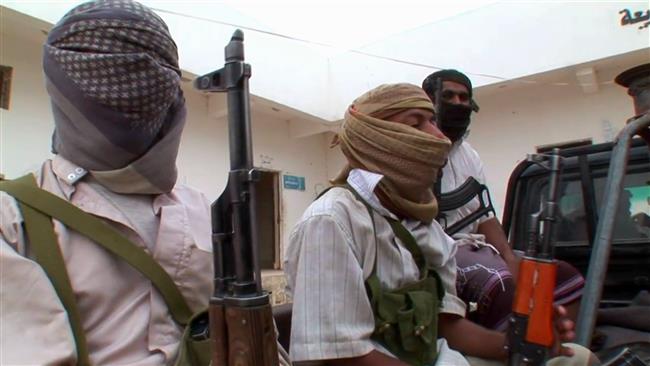
RNA - Qasim al-Rimi, the ringleader of Al-Qaeda in the Arabian Peninsula (AQAP), made the remarks to the terrorist group's media arm al-Malahem from an undisclosed location in war-torn Yemen on Sunday, adding that his militants had teamed up with an array of other "factions," including Salafist groups and the "Muslim Brotherhood," who are both key militias on Hadi's side.
The AQAP is perceived as the most active branch of the al-Qaeda terrorist group and has been considered by Pentagon as the most dangerous offshoot of the global terror network. Washington has already offered a $5million prize for al-Rimi's capture.
Since March 2015, Saudi Arabia has been heavily bombarding Yemen as part of a brutal campaign against its impoverished southern neighbor in an attempt to reinstall Hadi, a staunch ally of Riyadh, and crush the Houthis, which is in control of large parts of Yemen including the capital Sana'a.
Militia fighting for Hadi, who initially fled the country to Riyadh, managed to capture Aden in July 2015 with the military help of the Saudi regime after it fell to Houthis in September 2014.
Since then, Hadi, along with his supporters and militiamen, have turned the port city to their base, calling it the country's temporary capital, and have gone hand-in-hand with the Saudi war machine against his own people. The brutal Saudi aggression has so far claimed the lives of more than 12,000 Yemenis.
The AQAP has taken advantage of nearly two years of the Saudi military campaign and the resulting chaos and breakdown of security in Yemen to tighten its grip on the southern and southeastern parts of the Arab country.
Washington also carries out drone airstrikes in Yemen alongside the Saudi military aggression against the impoverished conflict-ridden country, claiming to be targeting AQAP terrorists; however, local sources say civilians have been the main victims of the attacks.
UN warns about possible Saudi attack on Yemeni port
The UN's high commissioner for human rights, Zeid Ra'ad al-Hussein, warned on Monday that the world body was continuously receiving alarming signs that the so-called Saudi-led coalition could attack the key port city of Hudaydah, causing humanitarian suffering and loss of life.
"The UN is concerned about the humanitarian repercussions of such an attack in terms of inflaming the humanitarian crisis even further, let alone our concerns about loss of civilian life were there to be a large-scale attack on the port," he told a press conference in Geneva, Switzerland.
Late on March, the UN had also said that it was “extremely concerned” about a potential attack on the western port city. “We as the United Nations are advocating that no military operations should be undertaken in Hudaydah,” said UN Special Envoy for Yemen Ismail Ould Cheikh Ahmed at the time.
The strategic port of Hudaydah, currently under the control of Yemen’s Houthi Ansarullah fighters, is part of a broad battlefront where Saudi-backed forces are fighting the Yemeni army and its Houthi allies.
The powerful resistance put up by the Houthi fighters has bogged down a supposedly militarily-superior Saudi Arabia. Observers say Riyadh has not only failed to reach any of its goals from the war on Yemen, but has also been unable to pull out from the conflict in a face-saving manner.
This is while recent reports say Washington is considering a more assertive role in the war on Yemen by providing more assistance to the Riyadh-led military alliance by carrying out an offensive against Hudaydah aimed at eliminating the Houthi fighters and allied army and popular forces.
847/940